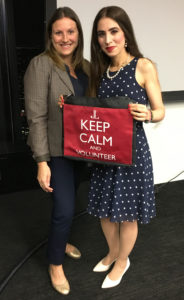AGM Guest Speaker – Dr. Katy Kamkar
 Dr. Katy Kamkar, Clinical Psychologist at the Centre for Addiction and Mental Health (CAMH) and Assistant Professor, Department of Psychiatry, University of Toronto gave an engaging and informative talk about mental health at the AGM on September 25. What follows are some highlights from her presentation.
Dr. Katy Kamkar, Clinical Psychologist at the Centre for Addiction and Mental Health (CAMH) and Assistant Professor, Department of Psychiatry, University of Toronto gave an engaging and informative talk about mental health at the AGM on September 25. What follows are some highlights from her presentation.
In any given year, one in five Canadians will experience a mental illness. The economic burden of mental illness in Canada is estimated at $51 billion per year, which includes health care costs, lost productivity, and reductions in health-related quality of life. Depression is the leading cause of disability worldwide. And the recurrence rate of a mental illness is seven times that of a physical illness.
Dr. Kamkar talked about problem of stigma and self-stigma and described the Mental Health Continuum Model, which ranges from healthy, to reacting, to injured, to ill. She also described symptoms of Major Depressive Disorder, which can include persistent sad, anxious or empty mood, feelings of helplessness and/or hopelessness, fatigue, irritability, loss of interest in activities, lasting more than two weeks.
One way of looking at mental health is one’s ability to enjoy and engage in life. Being mindful, resilient, balanced, achieving one’s potential, and flexibility all contribute to good mental health. While these protective factors don’t make us immune to mental illness, Dr. Kamkar suggested that building resilience can be very helpful to our mental wellbeing.
Resilience is about bouncing back from life’s challenges, both big and small. While some people are more resilient than others, we can all learn to be more resilient. Building resilience is an ongoing process, and below are some strategies suggested by Dr. Kamkar.
- Build healthy relationships, creating a social support network, and both seek and give help.
- Try to reframe a challenging event in a way that could be helpful, by putting it into perspective, looking at it as a learning opportunity.
- Accept circumstances that can’t be changed, and focus on what you can control and change, which makes you feel more powerful, self-confident and hopeful.
- Develop realistic goals, take gradual steps towards them, and appreciate each step taken.
- Where possible take an active approach to problem solving, because avoidance rarely makes problems disappear.
- Following difficult events, try to find opportunities for self-discovery about your strengths, resourcefulness. This helps build self-confidence and problem solving.
- Keep a long-term perspective, looking at challenges in a broader context.
- Maintain a hopeful outlook, and visualize what you want, which tends to lead to better problem solving and an active approach to challenges.
- Look after yourself. Engage in self-care, by paying attention to your needs and feelings, exercising, eating properly, getting good sleep, and relaxing. As Doctor Kamkar says, “Love me, love me, love me.”
Strengthening resilience is individual, so try some of these strategies and see which ones work best for you.
Written by Adrienne Fischer